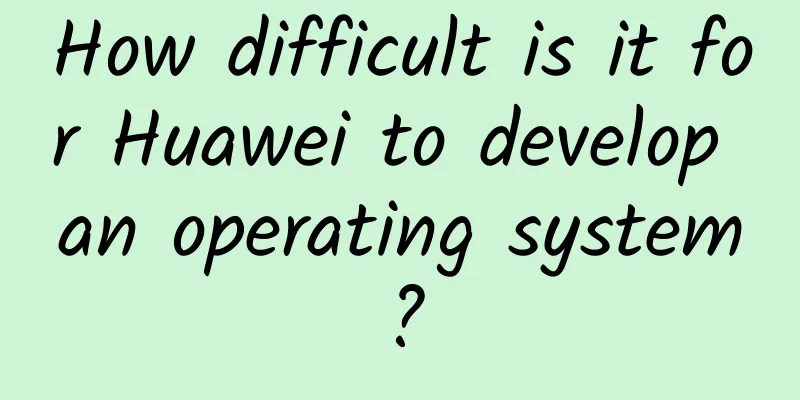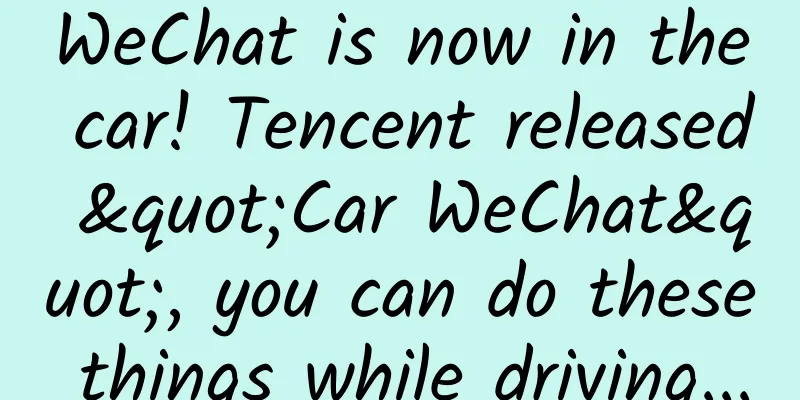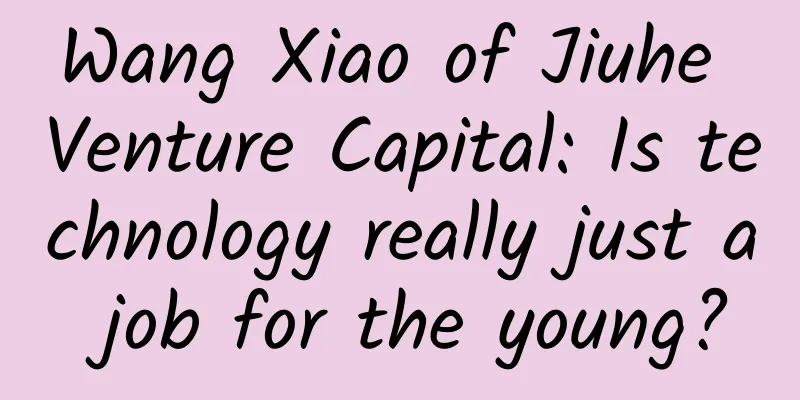How difficult is it for Huawei to develop an operating system?

|
Some time ago, a piece of news was widely reported in foreign media: Chinese telecommunications equipment giant Huawei is developing its own smartphone operating system. Based on domestic speculation and doubts, Huawei Senior Vice President Yu Chengdong said on Weibo, " The Android operating system and ecosystem created by Google have greatly promoted the development of smart terminals and benefited consumers. As long as the Android system remains open, Huawei smartphones will always use this operating system and ecosystem, and make some improvements in performance and experience based on the Android system to better meet the needs of consumers in various countries." But in fact, we found that Yu Chengdong's response was neither affirmative nor negative, but from the implication of this sentence, Huawei's use of Android includes a premise that Android is open. If Android does not remain open, Huawei may not use the operating system. This does not deny the possibility of Huawei's own operating system. It is said that the background of Huawei's development of the operating system is that Google, which owns the Android system, is discussing cooperation with mobile operators to launch its own brand of mobile phones. This has made Android mobile phone manufacturers feel a sense of crisis, which means that Google wants to use Android to harvest the market. Therefore, it is said that Huawei has also brought in former Nokia engineers to help. However, how difficult is it for Huawei to make a successful operating system? Difficulties in developing operating systems: long cycle, lack of technical iteration accumulation, large but weak domestic software industry and dependence on Western frameworks The author once pointed out in the article "Ignoring the Weakness of the Lack of Operating System: The Bubble Behind Huawei's Challenge to Apple" that Huawei wants to surpass Apple and become the world's number one within three years. But it lacks a key thing, which is the operating system. At present, smart phones have developed to a very mature stage. Domestic manufacturers are no longer able to build a platform with operating systems as the core to compete with Apple. It is already very unrealistic to re-develop an operating system, let alone build a set of integrated hardware and software ecosystems based on the operating system. If domestic mobile phone manufacturers are still limited to the so-called packaged black technology with no highlights, and keep ignoring their own weaknesses and clamoring to challenge Apple, the gap may become larger and larger in the future, and the bubble will soon burst. Therefore, if Huawei develops its own operating system, it is obviously to save itself. If Android tightens permissions one day, Huawei's self-developed system will at least have an emergency backup to prevent it. However, developing an operating system generally requires several conditions: First, a huge amount of money. For example, Microsoft spent more than 20 billion US dollars to develop the Windows Vista system. Linux also costs about 10 billion US dollars. At present, Google and Apple's operating systems have developed to a very mature level. If you want to develop an operating system to compete, the investment in funds is imaginable. The second is technology. The bottom layer of Apple is the secondary development of UNIX, and the bottom layer of Android is based on the secondary development of Lunix. After filtering and evolving, the two factions have their origins in Unix, so both are two branches that extend from the accumulation of predecessors' technology. After Microsoft launched Windows 1.0 in 1985, it went through many optimizations and periodic iterations of Windows 98, 2000, etc., and finally developed to XP system. Therefore, Huawei has to come up with an operating system out of thin air and develop it to a higher level. It also has the problem of technology accumulation and iteration. The development cycle of the operating system is long, and it takes time to continuously optimize and iterate. This is Huawei's biggest problem. In the smartphone industry, changes are too fast. It is unrealistic to want to make an operating system in a short time to catch up with Google and Apple, but it can't wait too long . Moreover, the development of the system is difficult in the kernel. The system kernel is a relatively complex thing, divided into many modules. The design between many modules must take into account scalability, software architecture design, algorithms, code control and many other aspects. Therefore, in China, the OS of many domestic mobile phone manufacturers are modified based on the upper interface of Android, such as Huawei's EMUI and Xiaomi's miui, which make some improvements in performance and experience based on the Android system. At most, it is an Android vest, but the underlying system is still the Android kernel. As for Huawei, in fact, compared with hardware, software development and design is not its core competitiveness, and it is also a relatively weak link in Huawei's system. There are too many missed lessons and too many links to make up. Because even from the overall situation in China, the software industry is also dependent on the Western technology system and top-level standard design, without its own programming language and software development tools. The software industry is doing content filling and design development within the framework of the Western technology system. The essence of the software industry is still big but not strong, which is ultimately reflected in the vacancy of the operating system system. For Huawei, hardware strength is stronger than software. For example, the latest EMUI 4.1 has been complained by the industry that it still cannot get rid of the shadow of Apple's iOS, and the overall experience is inferior to Samsung TouchWiz and HTC's Sense. Therefore, when its software strength is weaker than that of domestic and international Internet giants and even mobile phone manufacturers such as Samsung, if it really wants to develop an operating system, there is still a lot of homework to be done in terms of technology and software issues. An operating system is just a platform. Without a rich software ecosystem, it is just an empty shell. Finally, there is the complete peripheral software and hardware ecosystem. For a company of Huawei's size, developing an operating system is more difficult in terms of funding and technology than in terms of the software and hardware ecosystem. Let's look back and ask ourselves why all traditional mobile phone manufacturers chose to join the Android camp instead of Nokia's Symbian system. Because essentially, Nokia's main user groups at the time were all high-end, mid-range, and low-end user areas, and the mainstream user groups were still mid-range and low-end users. Nokia attempted to rely on the Symbian system to encircle all traditional mobile phone manufacturers and rule the world, but this was a direct enemy of all mid-range and low-end traditional manufacturers. When Google launched the Android open operating system, it did not get involved in the mobile phone hardware manufacturing industry and had no direct market conflicts with traditional manufacturers. It was relatively neutral, and it was natural for traditional manufacturers who lacked operating system advantages to choose the Android system. Huawei would face the same problem if it developed an operating system, so it could only develop a closed operating system. If Huawei independently developed its own operating system, how to ensure the excellent experience of the system to convince application developers to turn to itself and form a software and hardware ecosystem was the key. Because an operating system is just a platform, without a rich software ecosystem, it is just an empty shell and meaningless. But for an operating system to develop, it must first quickly capture the market in the early days of smartphones, and secondly, develop slowly in the later stages, and only when it reaches a certain market share will application developers join. But even the latter is almost impossible for Huawei in the face of Android and iOS. Huawei, which excels in hardware, may face the challenge of integrating Nokia's Symbian system with hardware and software if it wants to develop an operating system The second issue is the integration of the internal operating system design team and hardware manufacturers. At that time, Nokia's smartphone team faced an important problem: the software team that designed the user interface and system was subject to the hardware team. The hardware team sometimes lowered the rules of the phone to achieve the goal of rapid sales, and even ignored the simultaneous promotion and optimization and upgrade of the software team, which led to the failure of Nokia's software and hardware integration and the very bad experience of the Symbian system. Huawei, which is mostly good at hardware, wants to make an operating system. Who will lead the hardware and software teams, how to integrate and promote, and how to keep the hardware development in step with the software upgrade, so it may also face the same problem. Therefore, it is not difficult to make an operating system. The difficulty lies in the prosperity of the application ecosystem and the system experience of the integration of software and hardware. How to ensure the stability and security of the system and how to attract more application developers to develop software with an empty shell platform are the key issues. But this difficulty is the same as the difficulty of building a platform to grab merchants from Tmall and JD.com. Currently, many Android manufacturers are making an OS vest based on Android's open source to push their own software, advertisements and other services, resulting in a decline in experience, and claiming to the outside world that it is their own system. This makes it difficult for Google to ensure the consistency of the Android experience. Moreover, Android has occupied the largest market share but has not made any money. Many manufacturers have taken advantage of Android's openness, resulting in increasingly serious fragmentation of Android. It is understandable that Google wants to launch its own smartphones, which will enable it to control the experience of the Android operating system and ensure the reputation of its own services (such as Google Search, Google Maps, and the app store Google Play) and the system. But this has caused relatively excellent manufacturers in the Android camp to start to feel a sense of crisis. So we must know that if a manufacturer is truly ambitious, it will have the idea of taking the lead and controlling power from the beginning, rather than waiting until it becomes big before thinking of the sense of crisis of being dependent on others and living under someone else's roof. But in fact, when Huawei developed its own operating system, it might not be considering to develop an independent system to compete with Google and Apple. Huawei knows that it does not have such strength yet. Instead, it is more of a gesture and strategy. That is to say, when Android begins to tighten its control, it wants to let Google know that other manufacturers still have alternative plans, and they can use their self-developed operating system to convince Google to open up its control. Once you get on the Android ship, and want to quit, you are like drifting in the sea without a lifebuoy. But Google is obviously impossible to be blackmailed, because if it wants to withdraw from Android, it will undoubtedly be like floating on the sea but throwing away the lifebuoy, and the cost is a crisis of life and death. Because if Huawei and other manufacturers withdraw from the Android camp, Google can support other manufacturers to grow rapidly, and other manufacturers in the Android camp are just lucky to have one less strong enemy, and can take the opportunity to grow. The Android camp has its own ecological system, and the total energy and total strength of hardware manufacturers in the system can remain constant and basically balanced. However, if they withdraw from Android and develop their own system, it will be a problem whether the mobile phone can be sold due to the differences in technology iteration and experience and the lack of an application ecosystem. As mentioned earlier, a new operating system without enough applications is equivalent to an empty shell, which is worthless and meaningless. Generally speaking, if it is not facing a food shortage crisis and a survival crisis, it is difficult for Android manufacturers to make the choice to leave the Android camp. We know that it is impossible for another iOS to defeat iOS. Moreover, the opportunity has passed. Perhaps after Huawei's operating system is formed, mobile phone manufacturers will have a different way of playing. For example, VR, modular, and foldable mobile phones have emerged one after another. These trends may break the rules of play dominated by the operating system. Therefore, according to the current dilemma, it is actually unrealistic to develop an operating system. What is more important is to think about how to break through the operating rules and framework system of smart phones under the existing operating system architecture. Breaking the shackles of the old rules of the game, upgrading the gameplay of mobile phones, making it cooler and more fun, under the current conditions, Huawei and other mobile phone manufacturers are not developing operating systems from scratch. The better approach is to seize the opportunity at the outlet of technology upgrades, wait for a better window of opportunity to come, and find a better path and technical gameplay to break the existing operating system system, and rise in another posture to compete with international giants. As a winner of Toutiao's Qingyun Plan and Baijiahao's Bai+ Plan, the 2019 Baidu Digital Author of the Year, the Baijiahao's Most Popular Author in the Technology Field, the 2019 Sogou Technology and Culture Author, and the 2021 Baijiahao Quarterly Influential Creator, he has won many awards, including the 2013 Sohu Best Industry Media Person, the 2015 China New Media Entrepreneurship Competition Beijing Third Place, the 2015 Guangmang Experience Award, the 2015 China New Media Entrepreneurship Competition Finals Third Place, and the 2018 Baidu Dynamic Annual Powerful Celebrity. |
<<: Microsoft China's leadership change cannot solve the lack of localization
Recommend
Analysis mechanism principle in tween animation source code
[[438831]] Preface After the tween animation move...
A box costs more than 400 yuan, and one dose lasts for 5 days? The new "magic flu drug" Mabaloxavir is popular, and doctors warn
The proportion of influenza A has just dropped, a...
Entered the industry at the age of 54, won the Nobel Prize at the age of 97, a legendary life of "good enough" and "old enough"
On June 26, 2023, John Goodenough, an American ph...
What should I do if I don’t dare to live broadcast short videos? What should I do if I want to live stream but don’t know how to put on makeup?
A big problem facing video creators is the issue ...
The whiter the hairtail skin, the more nutritious it is? Can eating fish eyes improve eyesight? Many people are unaware of this...
Expert in this article: Wang Silu, National Senio...
3 KOL delivery models, Xiaohongshu marketing strategy!
Double Eleven 2021 has just come to an end, and m...
What did the legendary good community do right?
On the evening of June 29, 2016, Qiu Ye, associat...
Why did the gorgeous nebula overturn the "palette"? Revealing the magical "Hubble color"!
Author | Zhou Yihao Audit | Huang Jian Editor | W...
10 classic marketing planning cases!
When doing marketing planning , there are three t...
Interpretation of China Unicom's "Hang Fei Bao": Buying an iPhone is a good deal
On May 20, Shenzhen Unicom and Essence Fund jointl...
Back to school season | Don’t panic when the new semester comes! These five preparations can help →
Children have gradually bid farewell to their hol...
McLaren 570S special edition unveiled, 25kg lighter
Recently, McLaren unveiled its lightweight versio...
What are the functions and advantages of developing Wanjiang’s self-service ordering app?
With the development of mobile Internet, many res...
5000 words reveal: Douyin’s distribution strategy for interest e-commerce
The title "The distribution method of Douyin...









